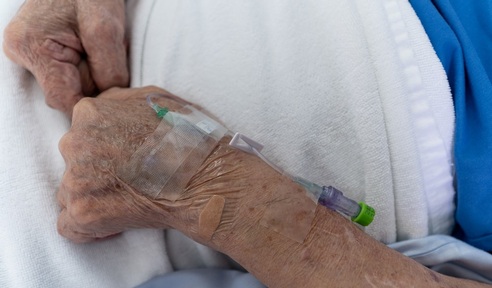Unpaid carers looking after terminally ill struggled to find support during pandemic, survey finds
Over three-quarters of carers looking after their terminally ill loved ones struggled to get the care and support they needed during the pandemic because these services were not seen as 'frontline NHS' in the pandemic, a new survey suggests.

The new survey of bereaved carers, by Marie Curie and conducted in partnership with data and insights provider Dynata, shows how palliative and end of life care in the UK was compromised by shortages of PPE, essential medicines, and equipment because these services were not seen as 'frontline NHS' in the pandemic.
Nearly two-thirds of carers surveyed by the charity said their loved ones did not get all the pain relief they needed when they were dying while eight per cent of unpaid carers said their loved ones received no support, 18 per cent very little support, 28 per cent some support while 22 per cent said they received full support.
Matthew Reed, chief executive at the end of life charity Marie Curie, said: “Many people will not be able to forget the deaths we have experienced this last year and it is vital the government, local health and social care leaders, and providers learn vital lessons from the pandemic. It’s heartbreaking to see that people dying at home, and their carers, struggled behind closed doors.”
“The government must now ensure end of life care is seen as essential and not a forgotten after-thought. How the dying spend their final days lives on in the memory of the people who love them.”
'No one should be allowed to die in pain and without the essential care, they need'
In 2020, the number of people who died was just over 695,000 – an increase of 91,000 on the previous five-year average (604,000).
The Office for National Statistics figures showed the number of those dying in their own homes rose by 42 per cent in England, Scotland and Wales in the year to March 2021.
“It is true most people would choose to die at home, but no one should be allowed to die in pain and without the essential care, they need. Today, we are calling for a long-term settlement to make sure end of life care is sustainably funded, with a particular emphasis on ensuring people dying at home always receive the support they need,” added Mr Reed.
Marie Curie has launched its Better End of Life research programme in collaboration with King’s College London Cicely Saunders Institute, Hull York Medical School, University of Hull and the University of Cambridge.
The programme will examine evidence on the current state of dying, death and bereavement across the four nations of the UK and propose a policy agenda aimed at helping to ensure that everyone has the best possible end of life experience.
The report says more needs to be done to understand the care people did and didn't receive to ensure that the whole system is ready for the increased number of people dying in the future, which is projected to be 100,000 more people a year across the UK in 20 years.
Mr Reed added: “The Better End of Life research programme has never been more needed. In coming years, it will help national and local decision makers across the UK have the evidence they need in order to improve end of life experience for all.”
'It is essential we learn from the pandemic to improve future provision of palliative and end of life care
The Better End of Life 2021 report also contains unpublished UK data from CovPall, a study of the role and response of palliative care and hospice services to the Covid-19 pandemic, it shows palliative care teams in all settings were stretched to and beyond capacity but proved a vital component to the emergency pandemic response.
However, too often, the ability of palliative care services to provide vital care and support was undermined by failing to be treated as a frontline NHS service.
Professor Katherine Sleeman, from King's College London and lead researcher on the Better End of Life 2021: Dying, death and bereavement during Covid-19' Research Report, said: "The data show that hospice and palliative care teams had problems accessing supplies, partly because they felt they were not recognised as part of NHS supply chains.
"The Covid-19 pandemic accelerated the need for palliative and end of life care in the UK. However, the experiences of those affected by dying, death and bereavement – whether as a result of Covid-19 or other conditions - have had little scrutiny to date.
“It is essential we learn from the achievements and weaknesses in care that the pandemic has exposed, to improve future provision of palliative, end of life and bereavement care."
To read the report, go to: https://www.mariecurie.org.uk/policy/better-end-life-report
click here for more details or to contact Marie Curie Cancer Care
Latest News
 29-Jul-24
Dementia Bus gives carehome.co.uk staff insight into life with dementia
29-Jul-24
Dementia Bus gives carehome.co.uk staff insight into life with dementia
 27-Jul-23
UK's top home care agencies in 2023 revealed
27-Jul-23
UK's top home care agencies in 2023 revealed
 30-Nov-22
A quarter of older people keep their falls secret from family
30-Nov-22
A quarter of older people keep their falls secret from family
 29-Nov-22
'Covid-19 has not gone away' say terminally ill
29-Nov-22
'Covid-19 has not gone away' say terminally ill
 28-Nov-22
IT consultant who received poor care opens 'compassionate' home care business
28-Nov-22
IT consultant who received poor care opens 'compassionate' home care business